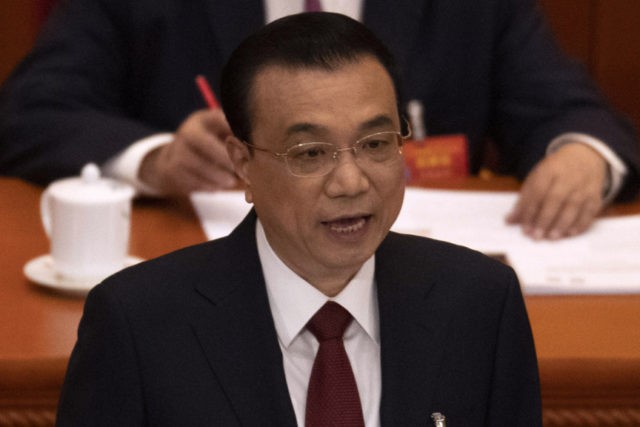China reduced its forecast for economic growth in the coming year on Tuesday, potentially heralding the slowest growth in 30 years, and announced $298 billion in tax cuts to stimulate the economy.
Bloomberg News noted the new forecast from Premier Li Keqiang uses a range of 6 to 6.5 percent growth as the target, rather than a fixed number, giving the Chinese government “room to maneuver” and cushioning the drop from last year’s 6.5 percent target. The premier’s office broke with recent tradition by declining to offer targets for retail sales or fixed-asset investment growth.
Economists outside the Chinese government predict 6.2 percent growth in 2019 and further “easing” in the two years after that. Stabilizing the currency, maintaining employment levels, and preventing further debt accumulation appear to be high priorities for Beijing.
Business Insider took a considerably gloomier view of the revised Chinese economic forecast, calling it “a sign of how much pain Trump’s trade war is causing.”
BI noted the Chinese premier explicitly discussed the “adverse effect” of “economic and trade frictions” in his report, making a “rare acknowledgment of weakness.”
“Beijing is generally hugely reluctant to acknowledge economic weakness, and Li’s words on Tuesday suggest the true gravity of the situation in an economy that not only faces external headwinds from the trade war but is also grappling with major internal issues,” BI explained.
Another important indicator mentioned by Business Insider is the remarkable collapse of optimism about the future among China’s financial elite. Two-thirds of them were “very confident” about the future in a survey two years ago, while only one-third expressed similar confidence in the 2019 edition of the poll.
The L.A. Times also found Premier Li Keqiang’s warnings “unusually stark” and “surprisingly frank,” particularly his admission of widespread public unhappiness with the performance of their government in key areas such as education, health care, and corruption.
“In an unusually frank summary, Li admitted that China’s business environment has fallen short of what business expects – a central complaint from Washington in the trade conflict – and admitted that Chinese innovation is weak,” the L.A. Times wrote in its analysis on Tuesday.
The LAT noted Li’s report was peppered with promises of reform, including reforms demanded by the Trump administration, such as superior protection for the intellectual property of foreign companies.
The report also included a surprising amount of fretting about social unrest due to mounting public unhappiness with the government, something authoritarian China rarely admits to being concerned about. The premier was especially concerned about military veterans angry about unpaid benefits and Chinese parents furious about a series of vaccine scandals.
Conspicuously absent from Li’s report was any mention of the bold “Made in China 2025” initiative to take high-tech manufacturing by storm, which could represent a soft climb down from boasts Li worries China can no longer keep, and/or a tacit acknowledgment that other nations are deeply apprehensive about China’s aggressive agenda.
“Our capacity for innovation is not strong and our weakness in terms of core technologies for key fields remains a salient problem,” Li wrote, nodding toward the climb-down hypothesis.
The L.A. Times alluded to China’s demographic crisis – the growing realization that coercive family planning policies might leave China without the young workforce it needs in the decades to come – and the unsatisfying results of China’s attempt to control pollution, which have been expensive enough to shutter some factories but not effective enough to reach environmental targets.

COMMENTS
Please let us know if you're having issues with commenting.